Wine tasting - and wine wasting!
Sunday, March 31, 2013
As I mentioned in a previous post, our friends Erik and Roma at Balt-Scandic Bodega in Algorfa host a wine tasting every Saturday afternoon. As is the way of the world, ever since we found out about this, we've had other things happening on Saturdays, so yesterday was our first chance to go to the wine tasting. Okay, as Erik says, every day is wine tasting day at the bodega, but we wanted to see what was happening, and if there were any new wines in.
As it was Easter Saturday, it was much quieter than usual, because there were lots of other things going on. However, a few people showed up, and we tried a very nice Francisco Gomez white, and also a rose. Then Erik regaled our taste buds with a sweet red dessert wine that tasted more like port than anything, followed by a really nice Moscatel. At just 9 Euro for half a litre, these are wines to be savoured rather than slugged.
It was quite a convivial afternoon, with a few people coming in 'just to look and taste' and going away laden with wines and seafood. Obviously the winte tasting afternoon is a great sales technique - nobody went home empty handed. We bought the Francisco Gomez white for Tony and I to share, and the rose, which is mine, all mine!
We're heading back to the UK at the end of April, so I also bought a 5 litre wine box of rose to try. I needed to make sure the wine was good enough to share with our friends and family back in the UK, so by the time I've worked my way through the box, I should have a good idea. At least, that's my excuse, and I'm sticking to it!
Actually, if you're driving back to the UK, wine boxes are a good idea. They don't take up so much space, they're lighter than bottles, and you won't get that annoying rattling as you drive along. Another bonus is that you can carry a lot more. With decent wine coming out at at least £5 a bottle in the UK, and Eriks' 5 litre boxes at 8 Euro, there's no contest.
The wine boxes are also produced by small independent growers, and although they're classified as table wines, they're much better quality than you'll get in the supermarkets. We bought a red wine box from Consum a while back, and it was so bad, it went down the sink. That will not happen with Erik's wine box - the wine is great. Don't take my word for it, though - if you're around La Finca, call in and try it.
As ususal when we head for the bodega, we spent more than we intended, so I paid with the plastic. I left the wine on the counter while I put in the PIN number, and there was a resounding crash - the bottles had slipped onto the stylish but unforgiving grey tiles, and rose and white was pooling in a pretty swirl of colours. Tony, being practical, asked if Erik had a couple of straws so we could limit the wastage. I reminded him that even if he did - and he didn't - when we got down there we'd never get back up without assistance, and there was only Erik and Roma there to assist.
Erik was even more practical - he poured us another glass of wine and sat us down out of the battle zone while Roma cleared the mess. Of course, I blamed myself. I've always been clumsy - my mother, bless her, used to say I was the only person she knew who could fall over fresh air. However, Erik said it was nobody's fault, and nobody got hurt, so let's have another glass of wine and relax.
Over the second glass of wine - which of course followed a number of tastings - we got a bit silly and said perhaps it was a poltergeist, and maybe we should market the place as 'The haunted bodega of La Finca.' Erik was the most sensible one, as he hadn't had any wine, and he thought maybe it would put people off, so we dropped that idea.
I do have one dubious distinction as a result of the visit, though. In the two months since the bodega's been open, not one single bottle has hit the tiles. Of course, I had to go for overkill and demolish two, but a great afternoon was had by all.
.JPG)
 0
Like
Published at 12:53 PM Comments (1)
0
Like
Published at 12:53 PM Comments (1)
Just another Tuesday night - with the Police involved!
Friday, March 29, 2013
I love Tuesday nights - it's my Spanish class, and as I've mentioned before, we have a lot of fun, as well as learning to 'habla espanol' along the way. On the way home, I was surprised to see three Police cars coming away from our urbanisation. We get the odd one that patrols around, but they're not like London buses - they don't usually come in threes.
I was a bit perturbed, and I was wondering what could have happened to neccessitate a mob-handed approach on La Finca. Tony's face when I got back didn't add to the 'feel good factor' I'd left the Spanish class with.
'We've had the Police around,' he said. 'Patrick brought them - you need to go and apologise to Angela. I've tried, but they won't speak to me.'
Patrick and Angela are very good friends, and I couldn't imagine why they would have felt the need to bring the Police to our door - especially as we'd spent a very convivial afternoon with them before the Spanish class. Of course, I was on sparkling water, because I was driving, but we had a good laugh, and I couldn't imagine what could have happened in the intervening two hours to change that situation. I said the only thing possible in the circumstances.
'What have you done now, and how drunk were you when you did it?'
Apparently, he'd fallen asleep in the garden - which was hardly surprising, the amount of wine that had disappeared that afternoon. Then he'd woken up, decided he was too hot, and stripped off. Angela had gone to take her rubbish to the bin, seen him in his birthday suit - which was in serious need of ironing - and screamed for Patrick when Tony invited her to join him on the sun lounger.
I didn't believe this for a minute. For one thing, Tony just doesn't strip off in public, no matter how hot it is. For another thing, he's a bit like our late, lamented Border Collie, Patch. Patch loved to chase cars, but he'd never have known what to do with one if he'd caught it. Tony's like that with women - he'll admire a nicely turned ankle, but he'd run a mile if said ankle's owner showed the least bit of interest.
However, Tony was keeping a straight face - too straight for my liking - and I had seen those three Police cars, which was a very rare sight in Algorfa. The only way I could see to deal with the situation was to move away from Algorfa as soon as possible, but I had to make sure Patrick and Angela wouldn't be pressing charges, so I went along with my apologetic face on. They were just about to sit down to dinner, which seemed a bit strange, given Angela's traumatic experience. The thing was, she didn't look at all traumatised. I'm a writer - I notice these things.
By now, I was beginning to suspect I was the victim of a wind up - and I was right. Patrick had brought the Police to our door - but only so that Tony could tell them where the President lived, as they wanted to notify him of the annual meeting with the Chief of Police. Sometimes, I could quite happily murder my husband!

 0
Like
Published at 9:18 PM Comments (0)
0
Like
Published at 9:18 PM Comments (0)
What does the Notary do?
Thursday, March 28, 2013
The Notary is one of the most powerful and respected figures in Spanish life. Whatever your nationality, you must involve the Notary in any major transaction such as buying a property or making a will. In England, when we make a will or buy or sell a property, everything is dealt with by the solicitor. In Spain, the solicitor does the leg work, but unless the Notary is happy, you cannot complete on your sale or authenticate your will. And the Notary, not the solicitor, will register your title to your property with the Land Registry.
When you see the Notary, make sure you are smartly dressed. If you are wearing shorts and a vest top, he will not see you. The Notary is very powerful and everyone is expected to show respect for his office by dressing appropriately. So it’s trousers and shirt for the men, although a tie is optional, and trousers, skirt – not too short - or dress for the ladies. There seem to be dozens of staff in the Notary’s office, but you can easily identify The Man Himself. He’s the only one wearing a jacket, even on the hottest day.
Even if your appointment is for 10.00am, don’t make any other arrangements for the rest of the day. The Notary Appointment System is one of the great mysteries of life. Nobody knows how it works; people arriving after you may go straight in, while others seem to languish there for hours. We waited for almost two hours to complete on our property . Our Estate Agent said we were lucky, as the previous couple he accompanied waited for 5 hours! And don’t bother complaining. In Spain, the Notary is akin to God, and you wouldn’t ask God how much longer you need to wait, would you? There is always a water machine in the Notary’s office, and some people even bring a packed lunch!
Before you complete your transaction, your solicitor and the builder’s representative, if you are buying a new property, will meet with the Notary and his secretary. You’ll witness lots of shouting, arm-waving and maybe laughter. You may think that they are about to come to blows over your dream home, but that’s how the Spanish do business. Reserve is a no-no, even in the august presence of the Notary. When he is happy that all the building and planning permissions are in place, that there are no debts on the property, and that all monies have been transferred, it’s your turn.
The Notary’s office is enormous and lined with books. There is usually a picture of the Great Man with King Juan Carlos – all the Notaries seem to have met him. All parties to the deal sit around a huge table, while the Notary reads out the complete title deed (escritura) in Spanish. Your passport is checked, and you are asked if you understand everything about the transaction. Then everyone present signs and your home is now truly yours.
There are Notaries in England, but they do not fulfil the same function as the Spanish variety. He is at the heart of both the local government system and his community. Seemingly, every newspaper seems to bring tidings of yet another Mayor or council official who has been jailed for corruption, but the Notary is universally trusted and respected. While he must undertake several years of further training after attaining the obligatory law degree before setting up office, the rewards and prestige attached to the office and person of the Notary are well worth the hard work involved in qualifying.

 0
Like
Published at 9:21 AM Comments (7)
0
Like
Published at 9:21 AM Comments (7)
'I'm not an alcoholic - I don't go to meetings!'
Tuesday, March 26, 2013
In 2008, Alcoholics Anonymous celebrated 20 years of operation in Torrevieja. There are 16 AA groups on the Costa Blanca, which reinforces one of my reservations about moving to the area. Like most people, I enjoy a drink or several.
While I’m nowhere near the stage of saying to a roomful of strangers, ‘My name is Sandra, and I’m an alcoholic,’ I can easily down a bottle of wine in an evening, and I’m very partial to a Bacardi and Coke or a Vodka and Lemonade. Mind you, I only drink when there's an 'a' in the day.
That's one area where English wins over Spanish, because in Spanish only martes and sabado have an 'a' in the day, so while my Spanish is progressing very nicely, thank you very much, my days are in English for the purposes of imbibing.
With the prices of booze so cheap here, how do you ensure that you won’t be scanning the classifieds for your nearest AA meeting sometime in the near future? My main strategy is to do something I don’t very often advocate – act as if you’re still in England. Unless you’re already on the way to alcohol dependency, you didn’t drink in the mornings in England, so don’t do it in Spain. Fruit juices, tea and iced water will slake your thirst without clocking up alcohol units.
I always keep a sliced melon in the fridge, as I find that even more refreshing than a drink. You should never use alcohol to satisfy a thirst, as a) it’s more likely to dehydrate than rehydrate, and b) alcohol is more-ish – one leads to another. If you start drinking too early in the day, you run the risk of being tipsy by teatime.
When we go into Algorfa for shopping, we invariably sit outside our favourite tapas bar for a while before attempting the 2 mile walk home. We buy one drink, and read the papers as we sup, so we have something to do other than empty our glasses.
I love to swim, and I never drink before swimming, so I always have my swim late in the afternoon. This has other advantages, too. The pool is less crowded, but the water is still nice and warm, so the swim is most enjoyable.
Where possible, make long drinks. Mix sparkling water with wine for a refreshing spritzer, or make a shandy instead of a beer once in a while. At around 5% Alcohol by Volume, Spanish beer is stronger than the English variety. In Spain, there are alcohol free or low alcohol equivalents to most of the main brands, and some are almost indistinguishable from the real thing. Try San Miguel, Mahou or Estrella Levante for a pleasant surprise. Unlike in England, alcohol free beers are very cheap here.
The Spanish enjoy Tinto Verano, or ‘Summer Wine.’ This is a mixture of red wine and lemonade, and served with ice and a slice of lime or lemon, it’s delicious. As well as keeping your alcohol units down, these measures will ensure you consume fewer calories. You won’t reap the full benefits of the Mediterranean Diet if you’re taking in lots of liquid calories.
Don’t think all this is intended to spoil your fun in the sun; I just want you to enjoy your new life to the full. To end on a lighter note, let me tell you about an argument we heard between two holidaymakers the other day. The wife was berating the husband for taking excessive advantage of the cheap alcohol.
‘You’re an alcoholic, you are,’ she said. ‘You haven’t been sober since we got off the plane.’
Quick as a flash, the husband replied,
‘I’m not an alcoholic I’m a drunkard. There’s a big difference - alcoholics have to go to meetings!’

 0
Like
Published at 11:20 PM Comments (0)
0
Like
Published at 11:20 PM Comments (0)
We were hungry enough to eat a small country, but - Macedonia?
Monday, March 25, 2013
If you're intrigued and/or confused by the title of this post, that's nothing compared to how I felt on Saturday afternoon. We'd spent the morning with our friends Jim and Joan, doing what Joan and I love best - shopping. On Saturday, we did it at Moncayo Market, on Lemon Tree Road, Guardamar.
After a few hours of dedicated bargain hunting, we were in need of refreshment, so we headed for one of our favourite restaurants, which happened to be just along the road at El Raso. There's a review on here, for those of you who aren't familiar with it. Anyway, it was quieter than usual, so we had a bit of time to chat to the waiters as we were served. As usual, we had a fantastic meal, and we were just about full to bursting point, but we just can't resist El Raso's home made desserts.
As the waiter ran through the desserts, he mentioned 'Macedonia.' This confused me, because in the UK, when we talk of 'macedoine,' we mean mixed vegetables. Often, Spanish equivalents of English words can be formed by dropping the last letter or two and adding an 'a' or an 'o' to English words, so I was a bit bothered about what was going to be served up for dessert.
Although our waiter spoke perfect English, he knew we liked to practice our Spanish on him, which was why he'd reeled off the desserts in Spanish. However, when he saw our perplexed expressions, he explained that 'Macedonia' is the Spanish term for a fruit salad. In fact, the full phrase is 'Macedonia de frutas tropicales' - or tropical fruit salad.
I was quite relieved, because although when we came in, I told him we were hungry enough to eat a small country, I didn't expect to be taken literally. So, another word for my Spanish vocabulary notebook, and another silly little anecdote for the blog. Oh, and the Macedonia was delicious - I can recommend it!

 0
Like
Published at 8:34 PM Comments (0)
0
Like
Published at 8:34 PM Comments (0)
Baked fish with tomatoes - a quick, tasty and easy lunch
Sunday, March 24, 2013
It's a bit chilly today, so a nice hot meal is the order of the day. However, if you don't feel like cooking a full meal, why not try this simple but tasty Mediterranean-style dish? It takes very little time to prepare, yet it tastes as if you've spent hours in the kitchen. It's a great alternative to a Sunday roast, when you want to eat like the Spanish do, and you can make it as cheap or as expensive as you want to. It's low in fat and calories, so although it tastes naughty, it won't do your waistline any damage.
Fish is much cheaper in Spain than in England, especially if you buy it from LIDL, Consum or Mercadona. In LIDL you can buy individually wrapped frozen fillets, or bags of frozen fillets. Consum and Mercadona have great fresh fish counters and also sell individual and bagged frozen fillets. Your fish meal can cost you as little as 2 Euro per serving, so what are you waiting for?
The beauty of this recipe is that you can use almost any white fish; cod, hake halibut and plaice all work well. As the cooking time is relatively short, go for a tail piece if using hake or cod. Serve with a jacket potato or potato wedges and peas or green beans. If you prefer it, you can serve with a large salad and a basket of fresh crusty bread. However you decide to serve this tasty dish, enjoy it!
These quantities serve 2 people:
• 2 fish fillets, about 250 – 350 grams total weight
• 1 large ripe tomato, sliced. (A beef tomato is ideal for this)
• Olive oil
• Balsamic vinegar
• Sea salt and freshly ground black pepper
• Fresh or freeze dried parsley
Heat the oven to 200 degrees centigrade. Layer the tomato in a shallow oven proof dish, drizzle with olive oil and balsamic vinegar and season generously.
Place the fish on top of the tomatoes and sprinkle with the parsley. Bake for around 15 minutes. Test with a fork to see if it’s cooked. The fish should be nice and white and should flake easily. If necessary, allow extra cooking time, but not too long – nothing’s worse than overcooked fish.
Using a fish slice and a spatula or cake slice, carefully lift each piece of fish with its bed of tomatoes. Pour the remaining cooking juices over the fish. Serve with a wedge of lemon or lime, and sit back and wait for the compliments!
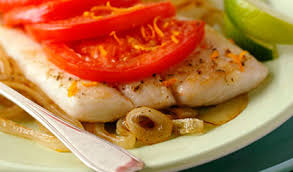
 0
Like
Published at 12:31 PM Comments (5)
0
Like
Published at 12:31 PM Comments (5)
Infamy, infamy! My bank's got it infamy!
Friday, March 22, 2013
Sorry about the headline, but it's been a hectic day, we watched Carry on Cleo on DVD last night, and I've just spent a couple of hours in the courtyard in the sun, with a bottle of cava for company. Now, where was I? Oh yes - the bank.
I avoid going into my bank if at all possible, Priscilla behind the counter is lovely, and she listens patiently while I practice my Spanish, but there's something wrong somewhere. Whenever I visit the bank, I can write off at least half an hour. Call me paranoid, but I think there must be a sensor in the door that sends a signal along the lines of 'Sandra's here - let's see how long we can keep her waiting today.'
The last time I went in to cancel a direct debit, there was only one person in front of me. Great - just a few minutes and I'd be on my way. How wrong can you be? The lady in front of me was 94 - I know that, because she told Priscilla so at least four times, along with the rest of her history in Spain. As it stretched back 35 years, that took some time. Then she started on the reasons she needed to move her bank account from Sabadell to Santander. They were many and varied, and bore repeating at least twice.
Finally, she got to the point. How easy would it be to move her money from six doors along the street? Priscilla assured her it would be very easy, but that wasn't enough for our Little Old Lady. We had to have chapter and verse twice, to make sure it was all crystal clear. By now I'd lost the will to live, but thankfully, LOL needed time to think about it. 37 minutes after entering the bank, it was finally my turn to step over the line labelled 'Espere su turno, por favor.'
Today, I had to brave the bank again, to make sure that the incompetent insurance company whose direct debit had been cancelled hadn't tried to claim it with a new reference number. Again, there was only one person in front of me, and my heart sang silently with joy when I heard him say, 'I just want to pay this bill for 3.37 Euro, please.' Maybe this time it would just be a quick visit, because I was getting a bit bothered that the bank would notice how much time I was spending in there and try to charge me rent.
Alas, it was not to be. When Priscilla processed the payment, the computer made funny noises, resulting in an exchange between Priscilla and Jose, who until today had never been seen to stand up from his swivel chair in the far left hand corner of the bank. In fact, some of us regulars wondered whether he actually had the use of his legs, but today we found out that he was indeed blessed with the gift of mobility. After 17 minutes of increasingly agitated dialogue, he stood up and walked behind the counter to press a few of Priscilla's buttons.
The printer sprang into life, and it transpired that the hapless gent who'd just called in to pay 3.37 Euro had to sign 3 copies of something, which then had to be faxed to head office. By now, there were about 10 of us in the queue, all itching to know what he'd done to make the computer go ballistic, and bring Jose to his feet for the first time in 5 years, as far as anyone knew.
Of course, we didn't find out. Priscilla was her usual helpful and apologetic self, and I left the bank 46 minutes after walking through its doors. So, help me out here. Does anyone else have this problem, or has my bank really got it in for me?

 0
Like
Published at 7:58 PM Comments (13)
0
Like
Published at 7:58 PM Comments (13)
Insurance - are you getting the best deal?
Friday, March 22, 2013
This post is a bit more serious than usual, because I'm not a happy bunny. Like most people who buy in Spain through estate agents, we were steered to a buildings and contents insurance, and because there was so much else to sort out, and the premium didn't seem to bad, we sort of went with the flow. When it came to renewing the policy, we were in the UK, and as we'd set it up on direct debit and it hadn't gone up, we went along with that. Ditto year 3.
Our problems arose in July 2011, when we returned from a 2 month trip to the UK to find something nasty in the underbuild - a freezer full of festering foodstuffs. Apparently, we'd had a power outage, and the freezer contents had thawed, then re-frozen, because the trip hadn't been reset. Don't ask me to elaborate - I don't do technical - but the smell emanating from the underbuild had nothing to do with the summer flowering jasmine.
We came home to a solid block of stuff, which our insurers - one of the main Spanish players - expected us to photograph. Why, I don't know, because you couldn't have picked out what was which with the best will in the world. I explained this over the phone to the very friendly operative, who agreed that a list of the contents and their approximate value would suffice. I agreed to list said contents, and fax them through with copies of our passports and NIE certificates.
I expected to wait a few weeks for the claim to be settled - we are in Spain, after all - but when September came and went with no communication, I headed to the local office. The very friendly - and very fit - guy in the office spent ages on the phone, then told me they needed a copy of the contents, plus passports, plus NIE, all of which had been faxed in July. We did it all again, just to be on the safe side.
Long story short, this scenario was repeated several more times - all for the sake of 97 Euro. I could have written it off, but I wasn't prepared to do that. Think terriers, think tenacity, times it by 10 and you may just be close to my mind set. I paid for insurance, and I wanted the insurance company to deliver what it promised.
I finally got the 97 Euro in my bank account a week before the policy fell due for renewal. Bit of a coincidence, that. I voted with my feet, and went to another provider, and this is what really got me annoyed. The policy we paid for - and had so much trouble making a claim on - was about the most basic there is. The trouble was, we weren't paying basic prices. We now have three times the contents cover, along with several extra benefits, for 70 Euro less than we've been paying for the last five years.
There's a lesson here - don't be rushed into your house insurance. Take the time to do your own research, and check it out every time it comes up for renewal. It hurts to admit I goofed, but it proves I'm only human after all. And if this salutory tale helps someone else, it's - almost - worth the aggravation I went through.
 . .
 0
Like
Published at 7:18 PM Comments (3)
0
Like
Published at 7:18 PM Comments (3)
There's a resident on the loose!
Thursday, March 21, 2013
Writing yesterday's blog post triggered a memory of something that happened years ago back in the UK. It doesn't have anything to do with Spain, apart from the reminder yesterday, but I think it's a story you'll enjoy, so it's worth sharing.
Back in the 1990s, my mother-in-law's Alzheimers became so bad that we had to have her admitted to a nursing home - we just couldn't cope at home any longer. I used to visit regularly, and chat to some of the other residents who didn't get visitors. One old lady was always dressed to go out, and given half a chance, she'd slip through the door and head for the shops. Usually she was apprehended immediately, but the frequency with which she attempted to break out earned her the nickname 'Mrs Houdini.'
Occasionally, she'd make it as far as the local shops, and because of her rather startling wardrobe, she was well known, and they'd give her a cup of tea and ring the home to collect her. Mrs Houdini didn't do colour co-ordination, in fact it seemed as if every day she tried to wear more colours than the day before. One particularly busy day, she managed to sneak out, and she wasn't missed until teatime. Matron checked out the local shops but drew a blank, so she called the local Police Station.
The desk sergeant asked what she was wearing, so Matron reeled off the day's ensemble: 'Purple and black checked coat, red straw hat, pink trainers, green socks and an orange shopping basket.' There was a long pause at the other end, and then the desk sergeant said, .'Madam, you do realise it's an offence to waste police time, don't you? Have you been drinking by any chance?' Before Matron could defend herself, he slammed the phone down.
Matron had to ring back and convince the desk sergeant that this was indeed what Mrs Houdini was wearing, and she was soon found safe and well sitting on a bench in the park. She certainly stood out from the crowd! After that incident, security was stepped up at the home, so Mrs Houdini's wandering days came to an end.

 0
Like
Published at 9:56 AM Comments (3)
0
Like
Published at 9:56 AM Comments (3)
A transvestite in the Spanish class
Wednesday, March 20, 2013
There, that got your attention, didn't it? We don't really have a transvestite in the Spanish class - it just seems that way sometimes. One of our teacher Alan's favourite ways of drumming vocabulary into our aging brains is to give us 'shopping lists' of things we want to buy. He's the shopkeeper, and we have to ask him for what we want in Spanish, then he'll tell us what it costs.
The Spanish government could do with him in the Hacienda to be honest - they'd soon be out of recession. A simple list like a pair of socks, a cotton skirt, a cookery book and five kilos of oranges can cost as much as 2,536.87 Euro. Alan says it's just to give us plenty of practice with numbers, but if he ever gives up the Spanish teaching and goes into retail, I for one will be steering well clear of his tienda.
Occasionally, even Alan makes a mistake, and a couple of us are brave enough - or foolish enough - to point that out. Yesterday, Tony - not husband Tony, he's trying his hardest not to learn Spanish, although the odd word is finding its way through - called Alan to task. He saw the red mist descend, and trembled. We all knew Alan would get his own back, but how would he do it? We soon found out when it came to vocabulary practice.
Tony's a pretty well-built guy with more than his share of body hair and an impressive moustache, so he blushed a bit as he read out his 'shopping list' in Spanish. 'Una blusa rosa de raso, una falda amarilla, medias moradas de seda, y sandales naranjas de cuero.' We all fell about laughing at the thought of Tony - or anybody for that matter - in a pink satin blouse, a yellow skirt, purple silk stockings, and orange leather sandals.
Then I remembered that last time we had a 'shopping list,' Tony had to ask for a green dress and silver earrings, and wondered aloud if he was trying to share his secret life with us. Cue more hilarity and Alan, with an evil grin, asking, 'Who made the biggest mistake today, me or Tony?' I just love Tuesday evenings!
   
 0
Like
Published at 9:16 AM Comments (1)
0
Like
Published at 9:16 AM Comments (1)
The (bogus) gas man cometh!
Tuesday, March 19, 2013
Along with soaring temperatures and mosquitoes, summer brings a very unwelcome visitor to the Costa Blanca – the bogus gas inspector. Like all the best scams, this one evolves from a grain of truth. In Spain, there is very little mains gas. If you have gas for your hot water, it is probably bottled gas, and the pipes and regulators must by law be inspected every 5 years.
The scam works like this: someone wearing an orange sweatshirt and carrying a blue clipboard will turn up unannounced to carry out a ‘compulsory gas inspection.’ He may flash an ID at you, and may even try to force entry to your property. After a brief inspection, your gas installation will be condemned, and you’ll be a few hundred Euro out of pocket. One unlucky pensioner was charged 425 Euro to replace an out of date pipe, yet all the ‘inspector’ did was dust the pipe, which was indeed in need of renewal.
Any reputable company will make an appointment to carry out an inspection, and their ID should be offered for thorough examination. The two companies who deal in gas in Spain, Repsol and Cepsa, may contract out the inspections to authorised companies. Your local Ayuntamento should be able to tell you who is authorised to carry out gas inspections in your area. Make a note of the name of the company and contact details, so you can check that your gas inspector is legal.
As the local press has been warning residents about the scam - which has been operating in one incarnation or another for years - the conmen have now added an extra nuance to make themselves more plausible. You may receive a phone call from someone purporting to be calling to make an appointment for inspection.
Appointments usually arrive through the post, but if the gas company does call for any reason, the caller will identify themself. The bogus gas men are unwilling to do so, and probably have very little English, so they will repeat a phrase like 'you must make appointment now,' and get more and more agitated and angry if you refuse.
Genuine employees are usually very polite, and will supply you with all the information you need, so this is the cue to put the phone down and call the gas company to check it out. Don't assume that just because someone has called your house, it's a genuine call from the gas company.
If you have any doubts at all, refuse entry. If your unwelcome caller refuses to leave, threaten to call the Police. This will usually do the trick. Sometimes these conmen operate in pairs, and one of them will be looking for things to steal while the other one carries out the ‘inspection,’ thus perpetrating two scams in one. If they do manage to talk their way in, don’t allow them unsupervised access to your home.
The only way to be really safe from conmen is to make it a rule never to allow any casual callers into your home. Legitimate tradesmen will not mind if you check with their office, and most Spanish companies operate an appointments system anyway, so you should always receive notice of any inspection visits.
Another gas related scam is operated by genuine but unscrupulous employees of Repsol or Cepsa. You could be asked for a sum - typically 30 Euro - for connecting your gas supply or for a non-existent insurance premium. While there may be a charge for connection, it will appear on your gas bill. Furthermore, the gas companies do not make a habit of offering insurance, as this should be included in your household policy.
These villains capitalise on your supposed ignorance of how things operate in Spain, so be aware of the scams and don’t let anyone separate you from your hard-earned Euros.

 0
Like
Published at 9:32 AM Comments (1)
0
Like
Published at 9:32 AM Comments (1)
Paella on the Internet
Monday, March 18, 2013
As Spain’s national dish, Paella is well represented on the Internet. Too well represented in fact, because when you Google Paella you’ll be presented with a bewildering array of websites. How do you tell the best from the also-rans? Maybe I can help.
Paella, like its Italian counterpart, Risotto, should be made from a few simple, good quality ingredients, to allow the combination of flavours to come through to the palate. Unfortunately, Paella and Risotto have been hijacked by what I call the ‘Leftover Specialists.’ In other words, the symphony of flavours that is a true Paella Valenciana has been turned into cheap pop music by so-called chefs who should know better. Paella Valenciana includes chicken, rabbit, sometimes duck, maybe a few snails, rice, of course, various spices, tomatoes and beans. Let’s look at some Paella recipes on the Web and separate the heroes from the villains.
The best Internet Paella recipe is at Alicante-Spain.com. The recipe is for authentic Paella Valenciana, courtesy of site owner Hubertus Keil’s Spanish mother-in-law. The instructions are clear and concise, and there’s even a video demonstration to help you make the perfect Paella Valenciana, plus lots more background information.
Spanish cookery writer Janet Mendel has some good tips for preparing Paella and gives lots of interesting background information on its origins, plus other similar recipes. Not a true Paella Valenciana, but at least the extra added ingredients, such as peppers, combine well to make an authentic Spanish dish.
I never thought I’d accuse Delia Smith of being a cookery villain, as I’ve used lots of her recipes successfully. But when it comes to Paella, Delia makes the all-too-common mistake of non-Spanish cooks: she adds onions and Chorizo sausages. Onions dominate the other flavours which are absorbed into the rice, so they should never feature in Paella. Many chefs include Chorizo in Paella just because it’s Spanish, but Delia, you disappoint me. You should know better! The rest of the website is great, though, so I’ve included a link.
Eat Paella.co.uk is a UK site which supplies everything for the Paella cook, from pans, to burners, to spice kits. Prices are more expensive than you’d pay in Spain, and they only deliver to the UK, but I’ve included the site for its excellent recipe for Paella Valenciana, as well as the useful hints and tips page from Spaniard Jose Lluna. There are also recipes for Seafood Paella, Vegetarian Paella and Sangria.
Anthony Worrall Thompson is my next Paella Villain. His recipe on the BBC Food website has a list of ingredients as long as your arm, including pancetta, thyme and chilli flakes, which have no business being anywhere near Paella, let alone in the same pan. See what I mean about chucking everything in and calling it Paella? I love most of your recipes, Anthony, but this one’s a no-no.
My final Paella Villain is Channel 4 Food. Their crime is so bad, the recipe creator remains anonymous. Not only do they give a recipe for Chicken and Chorizo Paella with 4 cloves of garlic to make sure you lose any friends you still have after serving up such an abomination, they suggest you make enough to freeze for a second meal. FREEZE PAELLA!! Are you having a laugh? This recipe is enough to cause a Spanish Revolution. I’ve included the link, just so you can see I’m not making it up to get more readers.
Don’t be fooled by pseudo Paella recipes; true Paella is a dream come true, but some of the recipes on the Web are a Spaniard’s nightmare. My own favourite is the Alicante Spain recipe, although I must confess to adding some red pepper, as I love the long, sweet red peppers we can buy here. Buen Provecho!

 0
Like
Published at 1:49 PM Comments (4)
0
Like
Published at 1:49 PM Comments (4)
Free newspapers get content on the cheap - and it shows
Friday, March 15, 2013
As I mentioned in a previous post, English language newspapers are very expensive here, so it's great that on the Costa Blanca there are a number of free papers produced every week. Okay, there's a lot of adverts and not an enormous amount of content, but they have to fund the papers somehow, so you just have to accept it.
What I have a real problem accepting is the standard of the content. Most of the free newspapers only seem to have one in house journalist. The rest of the copy comes from eager amateurs who are happy to see their name in lights, so to speak, but are not really up to the job of producing content of a consistent standard. One newspaper blatantly offers writers the chance of fame and fortune, and then qualifies the statement by saying 'not exactly fortune, as we won't be paying you, but you will have a byline, and be read by lots of people.'
Big deal! I was approached by that particular paper a few years ago. The editor tracked me down through Facebook, after reading one of my articles online, and asked for permission to publish it. I was building up my freelance business, so I was happy to oblige, as I thought it may bring a few contacts my way. It didn't, but it was very gratifying when strangers stopped me in the street and said how much they enjoyed reading my article.
A couple of weeks later, the editor contacted me again, and said they'd received a lot of comments online about my piece, and would I consider writing a regular column, as well as reporting on local news in my area? 'Of course,' I replied. 'How much are you going to pay me?' To paraphrase Hamlet, 'The rest was silence.'
I don't expect to be paid megabucks - especially by a free newspaper - but I don't see why I should work for nothing. The editor admitted there was a lot of favourable feedback from my piece, so I reckon I was worth a few Euro a week to keep me on the paper and get regular quality content.
This isn't just my experience - a couple of weeks ago, I was talking to someone whose wife is a retired journalist. She approached the local papers with a view to a part time income, but the answer was the same from almost all of them - they were happy to publish her contributions, but they couldn't pay her.
The result of this false economy is that the papers are filled with substandard copy, and circulation is going down. It's no coincidence that the only free newspaper that seems to be expanding rather than shrinking or stagnating is the Coastrider. That's also the only newspaper that seems to have a proper editorial team rather than one journalist and a lot of occasional unpaid scribblers.
The Coastrider is now expanding into the North Costa Blanca with a Benidorm edition, and it has the largest circulation of all the free English language newspapers in the area. Maybe there's a lesson here for the others. When it comes to filling up your newspapers, quality counts. You get what you pay for - or rather don't pay for, in most cases.

 0
Like
Published at 9:52 AM Comments (6)
0
Like
Published at 9:52 AM Comments (6)
Why are English newspapers so expensive in Spain?
Friday, March 15, 2013
One of the downsides of life in Spain is that it's so expensive to buy a newspaper in your own language. That was understandable back in the days of planes with outside toilets, when the newspapers had to be flown in, but these days, it's all done online. The papers are printed in Spain, but all the editorial work is done in the country of origin, so why is it so expensive?
A Daily Mail in the UK is 55p, but over here, it's 2.20 Euro, and to add insult to injury, you don't get any of the free supplements or free gifts. A significant portion of my DVD and CD collection came via the Daily Mail, but these days, we only get them when we're back in the UK.
When we first arrived here, we used to buy a paper every day, even though we winced at the price. I can buy a bottle of LIDL vodka for the price of two newspapers, for heaven's sake!
A while back one of our friends worked out that, if you buy a paper every day - including Saturdays and Sundays when they're even more expensive - it comes out at in excess of 800 Euro a year! Putting that into perspective, that would pay our Aguagest bill and our community fees, and still leave enough over for a slap up meal on our anniversary.
These days, we peruse the British press online to keep up with the news and our favourite columnists. Occasionally, if there's something really big happening in the UK, we'll buy a paper and pass it around our friends after we've read it. And whenever somebody's coming over from the UK, we ask them to bring a couple of papers. I haven't quite got as far as asking them to fix their flights for Saturdays and Sundays so we can get the supplements as well, but I'm seriously considering it!

 0
Like
Published at 9:20 AM Comments (2)
0
Like
Published at 9:20 AM Comments (2)
The Maṅana Syndrome
Thursday, March 14, 2013
There are many reasons for choosing to move to Spain. The weather, obviously, and perhaps you want to escape the stress of everyday life? Well, you couldn’t choose better than Spain; nobody rushes around here, and the Spanish are so laid back, it’s lucky they don’t fall over.
Unfortunately, when it comes to service, this can be something of a problem. In Cornwall, where we moved from, things were very similar. Whenever you wanted a workman to call, , it would be arranged ‘Dreckly.’ (directly) In other words, at an unspecified time. In Spain, everything will happen ‘Maṅana.’
‘Maṅana’ is one of those Spanish words with several meanings. Most people know it means ‘tomorrow,’ but it can also mean ‘morning’ or ‘not today.’ When a Spaniard tells you your washing machine will be repaired ‘Maṅana,’ he means ‘Not today.’ Try as you may, you will not get a more specific answer. And no matter how many irate phone calls you make, you will have to go to the shop or workplace to get the service you want.
This is what happened to us when we bought the furniture and fittings for our new apartment. We were in Spain for 10 days to complete the purchase, and we were eager to spend a few days in our new home before returning to the UK. The company we bought our property through had an arrangement with a large furniture store that all items would be delivered and fitted within two days. On Tuesday, we managed to buy most of the essentials. On Thursday, almost everything was delivered, but two light fittings were missing. The electrician promised to return ‘Maṅana.’
We weren’t surprised when he didn’t show up on Friday, but when Monday came and went, we called the store. They said the fittings were out of stock, and they expected them the next week. As we were returning to the UK, we arranged for the electrician to come 3 weeks later. Surprisingly, he turned up when expected – with one light fitting! He promised to bring the other one ‘Maṅana!’ After a week of ‘Maṅanas,’ we called the store, to be told our light fitting would arrive ‘Maṅana.’
A week later, the recliner mechanism on our sofa broke, so we decided to visit the store to report it, and ask about the missing light fitting. Ramon, the sales assistant, apologised profusely about our broken sofa, and arranged to send someone to see what the problem was. We then asked about our light fitting. Two noisy phone calls later, Ramon assured us that our light fitting had ‘Just arrived this morning, and we were going to call you today to come and fit it.’ Someone would come out – yes, ‘Maṅana!’
Three days later, we were plus a light fitting, and minus the end of our sofa, which we were promised would be returned in ‘Una semana.’ Allowing for a few ‘Maṅanas,’ I waited two weeks before calling the store. They said they expected my sofa end to come back ‘Maṅana.’ After 10 more days with only two-thirds of a sofa, we returned to the store. Three noisy phone calls later, Ramon beamed and told us our repaired sofa section had ‘Just arrived this morning, and we were going to call you today to come and fit it.’ Sounds familiar, doesn’t it? Ramon realised I wouldn’t accept one more ‘Maṅana,’ and he said our sofa would be returned that very afternoon. Joy of joys, it was!
The Maṅana Syndrome has existed for centuries, and, despite the irritation of the rest of Europe, there is no sign of change. All I can advise is that you persevere until you get things done and remind yourself of all the benefits of living in Spain. Hasta Maṅana!

 0
Like
Published at 9:11 AM Comments (0)
0
Like
Published at 9:11 AM Comments (0)
Jane Cronin - the Spanish version of Victoria Wood
Thursday, March 14, 2013
If you’re living in Spain, you really should try to learn the language, no matter how daunted you are by the prospect. For a painless introduction to the language, you couldn't do better than to visit Jane Cronin’s website. Jane is a real celebrity on the Costa Blanca. She’s a bit like Victoria Wood in Spanish, telling funny tales about her struggles with the language when she first arrived in Spain, and singing songs about the Brits in Spain in her stand-up comedy show.
But there’s a serious side to Jane as well. She is an accomplished language teacher and runs a portable language school, teaching Spanish to the English and English to the Spanish. She writes regular columns for the local press, and organises cultural holidays twice a year. Jane’s approach to learning Spanish is holistic, as she rightly believes that, to really understand the Spanish language, you also need to understand the Spanish way of life.
On Jane’s website, you will find everything you need to ease you into the language and the culture of Spain. Like Julie Andrews, she ‘starts at the very beginning,’ with an A – Z of Spanish. Working through the alphabet, she explains in detail the pronunciations and uses of each letter. You can also catch up with her stand up show Not Mentioned in the Brochure via YouTube. There's a great blog, and you can purchase her DVDs and books, or register for a Spanish course through the site.
That said, the site is much more than a marketing tool. It is a veritable mine of information, with word lists to cover everything from calling the plumber to going to watch your favourite football team. After all, it’s not the same if you can’t shout ‘Expulsalo!’ (‘Send him off!) and ‘Arbitro, estas ciego?’ (‘Are you blind, ref?’) along with everybody else! There are even some choice swear words, should you feel the need for them. These are the sort of things that set Jane Cronin apart from other language teachers; she teaches you the sort of things that Spaniards say and explains how they do things, so you begin to feel at home with Spain and the Spanish.
There are several articles by Jane on Spanish life, including dealing with bureaucracy, the education system, and eating out. In addition, there are reprinted articles from the Costa Blanca News, ranging from interviews with lawyers and estate agents to an overview of life in modern Spain. Anything you can’t find out from the main site can probably be discovered through the ‘useful links’ page.
www.janecronin.eu is a lively, entertaining and informative site which you will want to bookmark and return to again and again. It’s a site which gives a balanced overview of life in Spain without taking itself too seriously. Visit the site soon and enjoy the magic of Jane Cronin.

 0
Like
Published at 8:52 AM Comments (0)
0
Like
Published at 8:52 AM Comments (0)
Inside the mind of a Spanish driver
Wednesday, March 13, 2013
In many ways, driving in Spain is easier than in the UK. The roads are better, and they're not so crowded. The only thing you need to watch out for are the Spanish drivers. As soon as he spots a British number plate - or any foreign number plate for that matter - the Spanish motorist morphs into Fernando Alonso. He simply must overtake, even on a bend or when there’s a solid white line in the road, which means no overtaking, just as it does in the UK. Make that especially on bends and solid white lines!
There’s a simple explanation for this. Your average Spaniard is very laid back and never in a hurry – unless he’s behind the wheel. Then, he just has to be there first. It’s nothing personal against the Brits, he’ll overtake anyone who isn’t going fast enough for him, which means just about everybody else on the road. That’s why when you’re already on a roundabout, a Spanish driver will leap out in front of you, because he knows he can get there first. Just make sure you’re ready for anything and don’t assume that because you have right of way you’ll have the roundabout to yourself.
Speaking of roundabouts, what's really annoying is the way the Spanish signal their intentions. They don’t, and you have to play Mystic Meg and guess where they’re heading. Again, a little basic knowledge of the Spanish character helps here. The average Spaniard is so full of his own importance behind the wheel he expects everyone to know what he’s doing and where he’s going. If you don’t guess right, it’s your fault, not his. He’s in a juggernaut, therefore it’s obvious he’s taking the motorway for Alicante. Why should he cut short his mobile call or stub out his cigarette just to let the other road users know?
It's catching, too - I often find myself doing exactly what I used to rail against the Spanish drivers for, and failing to signal on roundabouts. It's not so bad here, because if you do signal, you're in the minority, but it's earned me a few toots and old-fashioned looks back in the UK.
If you’re a pedestrian, take care when crossing the road, even on a pedestrian crossing. Make that especially on a pedestrian crossing. The Spanish view crossings as a challenge, not as a road safety measure, and the only time they’re likely to stop for you is if there is a policeman in attendance.
There are now red and white crossings on very busy roads in Spain, at which drivers are obliged to stop for pedestrians. Don’t bank on it, though, because nobody seems to have informed the Spanish motorists of their obligations, so they’ll sail across the red crossings happily.
The best way to get across the road safely is to try to cross where it’s patently dangerous to do so. The Spanish drivers will admire your spirit and disregard for the rules and will stop to let you across. I know, because it’s happened to me more than once, but don’t try it with young children in tow or while in possession of a zimmer frame.
Despite the quirkiness of Spanish drivers, I much prefer driving here to driving in the UK - I actually feel safer on Spanish roads, so don't let this tongue-in-cheek post put you off driving in Spain. Just be extra vigilant - particularly at roundabouts - and console yourself with the knowledge that at least the Spanish aren’t so fond of hooting their horns as the Italians.

 0
Like
Published at 9:33 AM Comments (18)
0
Like
Published at 9:33 AM Comments (18)
Did you apocopate today?
Wednesday, March 13, 2013
It's okay - admit it if you did. It's not illegal, and it won't frighten the horses, so apocopate as much as you like. Apocopation is the shortening of certain adjectives when they precede masculine nouns in Spanish. Apart from a couple of exceptions, apocopation never occurs with feminine nouns, so to remind yourself when to apocopate, just say to yourself 'Cut a bit off the male.' It works for me, but it might make masculine eyes water by association!
If you've been speaking Spanish for a while, you've probably been apocopating without even realising it. For example, if you're out for a snack at lunchtime, you'll ask for 'un bocadillo,' but if you want to eat healthy, you may ask for 'una ensalada.' The masculine 'uno' is the most common example of apocopation, and if you speak a little Spanish each day, you're almost certain to have used the shortened form.
'Bueno' is another common adjective that gets shortened with masculine nouns. When the waiter brings your bocadillo or ensalada - depending on whether you've gone for filling power or a healthy option - he'll say 'buen provecho.' However, if he was selling you a Euromillions lottery ticket., it would be 'buena suerte,' because suerte - meaning luck - is feminine, so there are no bits to cut off.
These are the most common short form adjectives:
- bueno - buen (good)
- malo - mal (bad)
- postrero - postrer (final, last)
- uno - un (one, a)
- primero - primer (first)
- tercero - tercer (third)
- alguno - algún (some)
- ninguno - ningún (none)
Other short form adjectives are grande, which becomes 'gran' when preceding both masculine and feminine nouns, ciento becomes 'cien' in certain instances, and cualquiera - meaning 'any' or 'whatever' loses the 'a' at the end.
This is Spanish we're talking, so there always has to be something completely different. In the case of apocopation. it's the word 'santo.' This is only shortened when preceding certain proper nouns, but not those beginning with 'do' or 'to.' So you'd say San Juan, but Santo Tomas. For more about apocopation, and to take a fun quiz to test your new-found knowledge, visit this web page.

 0
Like
Published at 8:44 AM Comments (0)
0
Like
Published at 8:44 AM Comments (0)
The roundabouts in Spain - this is not about driving!
Tuesday, March 12, 2013
On many roads in Spain, as you approach a roundabout, you will see one or two girls there, dressed in hot pants, clutching a mobile phone and carrying a bottle of water. These girls are not hitch hikers - there’s not a backpack in sight. They're prostitutes, and a lot of them are from Eastern Europe, although if you drive around enough roundabouts, you'll see all nationalities.
When we first came to Spain, friends of ours came from the UK in their motor home to help us move into our apartment. We arranged to meet them at their campsite, but we couldn’t find it. After several failed attempts, Glenys offered to walk up to a roundabout we all knew to meet us.
As we were newly arrived in Spain, we weren’t then aware of the ‘roundabout girls.’ When we collected Glenys in our car she said, ‘The people around here are ever so friendly. Lots of men have stopped while I've been waiting for you. I suppose they wanted to offer me a lift, but I told them I was waiting for someone.’
She was horrified when she discovered just why the ‘friendly men’ had stopped. Her husband, John, was devastated - he thought she'd missed a great opportunity to earn some extra holiday cash!
That isn't my only experience with a roundabout, and it took a while before I could laugh about this one as readily as I'd laughed at Glenys. When I was President of our community, I had to engage an electrician, who didn't know where to find us. I said I'd meet him at the roundabout by La Finca's commercial centre. As soon as I put the phone down, Tony said, 'You do realise you've just agreed to meet a man at a roundabout, don't you?'
To be honest, I hadn't even given it a thought. I was nearly 60 at the time, and although I'm pretty well preserved, I can't imagine anybody wanting to pay for what I have to offer. Besides, it's a tiny roundabout with not much passing traffic. If I left it until the last minute, I'd be just fine.
Of course, things never go to plan, and as I was walking to the rendezvous point, Jose - the electrician - called to say he'd been delayed by 15 minutes. I should have turned around right then, but I thought I could sit on the wall at the roundabout and wait.
I'd been sat there about 10 minutes when the local police went past on one of their regular patrols. When they saw me sitting on the wall and looking in the direction of Quesada, they wanted to know what was happening. Understandably, they weren't very impressed when I said I was waiting for a man.
I know I shouldn't have said that, but at the time, my Spanish wasn't up to explaining the full picture. Just when it looked as if I'd be spending the night in a cell, Jose arrived and addressed me by name, so the police turned their attention to him. He explained everything, and we went on our way, after the three of them had enjoyed a good laugh at my expense.
Later - much later - I also found the experience funny, and I felt quite flattered that the police might have thought I was a serious contender for horizontal earning potential, but at the time, it was a bit scary. I could just see the headline in the Coastrider: 'Community President arrested for prostitution on prestigious golf urbanisation.' Now I just have to find a suitable image for this post from somewhere.
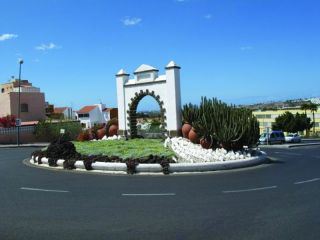
 0
Like
Published at 12:22 PM Comments (0)
0
Like
Published at 12:22 PM Comments (0)
Spain is sexy and she knows it!
Tuesday, March 12, 2013
The Spanish, and indeed most Europeans, have a much more relaxed attitude to sex than we do in England. By sex I mean pornography and prostitution. When you first arrive in Spain, it’s a concept you may have difficulty adjusting to. There are sex shops, just like in the UK in certain downtown areas, but the Spanish have no qualms about selling the sort of things you’d buy in the sex shops along with everything else.
You may be in a souvenir shop, (recuerdaria) looking for a nice pack of playing cards for your Aunty Vera, who loves to play cribbage. Alongside the cards with maps of Spain and beach scenes, you’ll find cards with such titles as ‘red hot poker’ and ‘beautiful babes.’ I’ll leave you to work out what’s on the reverse of those!
On the DVD stalls on the market, right next to the flamenco DVDs and cartoons, you’ll find hard core pornography for about 3 Euro per film. They’re so cheap, people smuggle them back into England to sell at 4 or 5 times the price. I wouldn’t recommend this as a way of subsidising your holiday, though. If you are caught with large quantities of pornography, you face a heavy fine and/or imprisonment.
In Spain, there are shops, similar to English ‘Pound Shops,’ where everything is cheap. Many are owned by the Chinese, so they are often called ‘Bazaar Chino.’ Here, you can bag some real bargains. In among the clocks and Spanish dolls, you’ll be astounded to find a wide range of sex toys. I was in our local one last week when a lady came in with her mother.
Mother, intent on causing mischief, picked up one of the more spectacular items and asked her daughter if she thought she should take one back as a present! The whole store was in uproar, as English, Chinese and Spaniards alike had a laugh at the expense of the poor daughter.
In the local English language press, together with the plumbers and builders, you’ll find adverts promoting other services. This week, Jason and Jasmine from Algorfa are offering discreet but comprehensive services in their garden apartment. You can have one of them or both of them, and they'll come to you if necessary. Quite appropriate wording, really - only the preposition is wrong!
The problem is, we also have a garden apartment in Algorfa, so now our friends have re-named us 'Jason and Jasmine.' Tony's quite proud of that, actually, although he says that at 79, he might have a bit of trouble keeping up with the state of play in a threesome.
While the red top tabloids in England have adverts for phone sex, you never see such blatant advertising of prostitution in a family paper. I was quite taken aback by it at first, but now I don't really take any notice, although I suspect the column is well perused in some quarters.
Sorry the image is a bit boring, but there's a limit to what you can use to illustrate a post like this, and this is a family friendly blog, after all!

 0
Like
Published at 11:58 AM Comments (1)
0
Like
Published at 11:58 AM Comments (1)
Algorfa - the little pueblo with an enormous heart
Monday, March 11, 2013
Never heard of Algorfa? I’m not surprised. Until we went on a property inspection trip in July 2007, I didn’t even know the place existed. When we excitedly told everyone in England that we’d found our dream home in Spain, they hadn’t a clue either. The only way to describe its location was ‘Near Torrevieja.’ However, the town that has become our home deserves to step out of the shadow of its big, brash neighbour. Let me tell you why I love Algorfa – the little pueblo with the great big heart.
Algorfa is a mix of traditional and modern, cosmopolitan Spain. As well as several tapas bars – my particular favourites are Cafe Larralde and El Badaluke in the Plaza de Espana – it boasts some excellent restaurants. Try Restaurant Alquiblia, Meson Viejo or The Vestry. If you miss your English breakfast, Bar Algorfa on the road from the La Finca Urbanisation into the village can feed your passion, as well as serving excellent tapas. For me, this symbolises the success story that is Algorfa; the large influx of English residents are integrating with the indigenous Spanish population, rather than creating a separate community which is basically England in the sun.
Tony and I usually walk the two miles from our home into Algorfa; the views are stunning and we can sample plenty of Manolo’s best wine in Cafe Larralde. When we do take the car, it’s no problem negotiating the town. In Algorfa, more than 4 cars waiting at a junction constitutes a traffic jam!
All the roads into Algorfa are lined with orange and lemon groves. As the pueblo nestles in the foothills of the Sierra de Callosa mountains, any route into Algorfa is a scenic route, but on foot you’ll see lizards and hares and hear the ever-present birdsong. Who wants to be shut off from all this in a hot metal box?
There’s plenty to do in Algorfa besides admiring the views, though. There’s a Cultural Centre, Social Club, and a Sports Stadium and swimming pool that would put many English Division One stadia to shame.
Algorfa may be small, but it thinks big, and there are all the events that grace much larger towns, without the huge crowds which spoil enjoyment of fiesta days. In March, there’s the Fiesta of St Vincente Ferrer, Algorfa’s patron saint. A silent procession and Mass in the saint’s honour is followed by a huge paella in the Plaza de Espana.
In April, there’s a two week spring cultural festival, then there's the gastronomic festival in June, and the summer fiesta in July – I could go on and on. Come to Algorfa, visit the Ayuntamiento and see what’s happening here.
For the World Cup Final in July 2010, the Plaza de Espana was filled with tables, chairs and televisions, as well as a big screen which could be seen from all over the square. Everyone was there, the atmosphere was electric. and of course, the result was right! The party went on all night, although we gave up and came home to bed about 2.00am.
There’s a good mix of local shops – including Tien 21, which has better deals on electrical and white goods than most of the big outlets in the towns. However, if you can’t get what you want at a good price in Algorfa, Almoradi and Torrevieja are just a short drive away.
For the golf enthusiast, there’s the prestigious La Finca Golf Course. Tennis courts, riding stables and a swimming pool are also nearby. The beaches of the Costa Blanca are a short drive away, and Algorfa is close to both Alicante and Murcia, the region’s two airports. ‘Near Torrevieja?’ Algorfa is streets ahead!
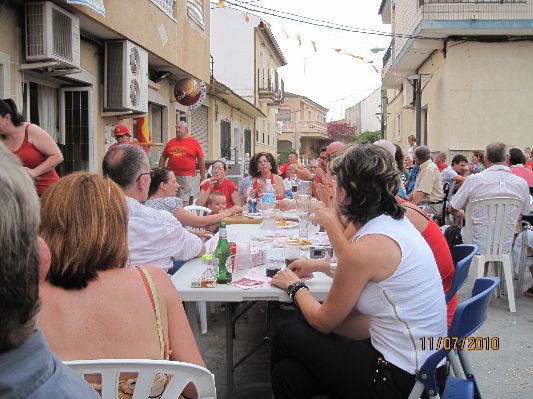
 0
Like
Published at 11:15 AM Comments (2)
0
Like
Published at 11:15 AM Comments (2)
Sandra's special sangria
Monday, March 11, 2013
Think of Spain, and you think of sun, sea and Sangria - or so the cliche goes. Sangria comes in many shapes and sizes, from pleasantly light and refreshing, for a hot afternoon, to ‘Comes with a Health Warning’ for an evening of serious partying. The mixture also varies from undrinkable - usually the ready-made variety - to absolutely wonderful. You won’t encounter undrinkable in a Spanish bar; every Spaniard I’ve ever met can rustle up spectacular Sangria. It’s a talent they’re born with.
One of the best Sangrias I’ve ever tasted cost only 5 Euro for a 1 litre jug at a cafeteria in a Sunday market. The secret is to soak the fruit in the alcohol for at least an hour before completing the Sangria. Everywhere that I’ve considered the Sangria to be worth a return visit, there are always jugs of fruit and wine waiting to be mixed and enjoyed. Any bar using tinned fruit instead of fresh should be avoided. That’s the cheat’s way, and you can’t cheat with Sangria. The first sip gives you away.
At the risk of sounding conceited, I must say that my rocket fuel sangria is legendary. If there's a problem with it, it's that it slips down too easily. Our friends have a saying for this - when they've overdone it on the sangria, they tell people they've been 'Piddocked.' I'm thinking of submitting it to the Oxford English Dictionary as a new word, once I've ironed out the finer points of the definition.
One friend who didn't heed the warnings of those who'd been Piddocked before him gave us a good laugh, although it took a couple of days before his wife would speak to him without a look of pure contempt on her face. After supping sangria well rather than wisely, he fell down the terrace steps and landed in Tony's gladioli bed. The 4 feet high specimens were cut off in their prime, and he emerged covered in bark chippings and pink gladioli flowers, which rather clashed with his orange shirt.
We were laughing so much that we failed to notice his - very expensive - sunglasses were missing. We found them, bent and broken, as we tried to resuscitate the gladioli, but he'd already gone by then. He obviously hadn't missed them either, because when he got home, he spent twenty minutes trying to take off his non-existent sunglasses, before saying, 'Bugger it - I'll just have to sleep in them' and collapsing into bed. Here's how to make my special sangria.
I usually make two 1 litre jugs – one is never enough, and if there is any left over –unlikely, but it may happen – it will store in the fridge for a couple of days in a covered jug. Remove the fruit before storing, though. Chop the fruit into small pieces about ½ inch square. Leave the skin on everything, except mangoes or kiwi fruit. Prepare enough fruit to give 2 – 3 inches depth in the jug.
What fruits to use? Anything that takes your fancy, is in season, and is ripe enough for the juices to flow. Avoid bananas, as they start to break up in the alcohol almost immediately and will make your drink cloudy. We live on the Costa Blanca, where oranges are cheap, juicy and plentiful. Strawberries are lovely at the moment, as are plums and melons. I always add some apple, as well. If you don’t want too much sweetness, add some lemon or lime.
Now add alcohol. My favourite blend is brandy, sherry and red wine. How much? That’s up to you. For a refreshing but not overly strong Sangria, I use 4 single measures of brandy, 1 wineglass of sherry and 2 large glasses of wine in a 1 litre jug. Don’t waste money on decent red wine. An ordinary table wine or ‘vino de mesa’ is fine for Sangria. Allow the fruit and alcohol to stand for an hour or more.
To finish your Sangria, add plenty of ice, then top up with lemonade or gaseosa For special occasions, or for higher alcohol content, use half lemonade and half cava. Stir well and serve, ensuring everyone gets some ice and fruit in their glass.
For children or drivers, prepare non-alcoholic Sangria using red grape juice, apple juice and lemonade. Left over fruit from your Sangria will store in the fridge for two days. It makes a tasty topping for ice cream, cheesecake or yogurt, but be careful, as the fruit will contain alcohol. Remember, making good Sangria is an art, not a science. The correct quantities are those that work for you. Enjoy!
   
 0
Like
Published at 9:29 AM Comments (0)
0
Like
Published at 9:29 AM Comments (0)
A view from the other side - what the Spanish don't like about Brits
Friday, March 8, 2013
Spanish people are renowned for their tolerance and hospitality, but there are some things about the British that they just don’t like, and I’m afraid it’s our own fault. Spain is renowned for cheap booze, but who gets really off their faces and throws up in public? That would be us. You may think our reputation is unfair, but I’ve been watching, and it’s only the British who get obnoxious through drink.
Spaniards start the day with coffee and brandy, and have plenty of wine or beer with lunch. Then they’ll go for tapas and a drink before dinner. Like us, they often drink more than they should. The difference is, when they know they’ve had enough, they’ll go home quietly, sometimes assisted by a stern look from Mama. They generally have too much respect for themselves and their families to cause embarrassment in public.
Another thing they’re not happy with is our dress – or rather, the lack of it. Remember, Spain is a Catholic country. Things have changed since the 1960’s, when Franco’s police would arrest anyone wearing a bikini on Benidorm beach, but they still don’t like the way we peel off as soon as we land at Alicante airport.
On the beach, Spanish men will wear the tiniest of thongs, and their ladies may go topless, but before they reach the promenade, they are covered up. They hate the way Brits walk into restaurants and supermarkets - the men naked from the waist up, and the ladies with a skimpy bikini top and micro shorts. You wouldn’t go into Sainsbury’s dressed like that, so you shouldn’t go into Mercadona half naked either.
It’s got so bad now that many shops, restaurants, bars and supermarkets have put up signs requesting that both ladies and gentlemen wear tops when entering. They shouldn’t have to do that, but I’m glad they do. The thought of sitting on a plastic chair that’s just been sweated on by a Brit with a beer belly is enough to put me off my cava – and that takes some doing, I can tell you.
It’s a question of having respect for your surroundings and dressing appropriately. Recently, we were in an Asian buffet restaurant. The decor was stunning, with crystal chandeliers, and cherry wood tables with glass tops, underneath which were beautiful jade carvings. The restaurant looked and felt exclusive, yet a 3 course buffet meal was only 8 Euro a head. Our party of 4 dressed for the occasion, but we were amazed how many men wore vest tops and Hawaiian shorts. They looked completely out of place.
Try not to go barefoot in the park. The only place the Spanish remove their shoes is on the beach. Even poolside, they leave their flip flops by the steps, ready to step into them as soon as they emerge from the water. And please don’t stretch your arms above your head if a Spaniard is nearby. They think that showing your armpits is - the pits! I’m not sure why; perhaps it’s because the Spanish are so fastidious about personal hygiene. Most feet and armpits, whatever their nationality, will not stand up to public scrutiny.
Finally, the thing that really gets the Spanish goat is our reluctance to learn, or even take a stab at, the Spanish language. And we’re arrogant enough to assume that they should all speak English! Even a hesitant ‘Dos cervezas, por favor’ will earn you the respect of your waiter. More Spaniards than ever can now speak excellent English, but that’s beside the point.
We’re the visitors here, and we should at least try to fit in with the locals. If we do, we can enjoy our time in Spain without upsetting or offending the indigenous population.

 0
Like
Published at 9:16 PM Comments (12)
0
Like
Published at 9:16 PM Comments (12)
Steering clear of road crime in Spain
Friday, March 8, 2013
Spain, like any other country in the world, has its share of crime. At the moment, so called ‘road muggings’ are hitting the headlines. You might think Spain’s roads are completely lawless from what you read in the papers, but a little advance warning should help you to keep out of trouble.
On main roads from the airports and ferry ports, bogus police officers are stopping unsuspecting motorists and robbing them. If you’re driving a car with British number plates, or a rental car with a sticker from the company in the back, the criminal fraternity see you as an easy target. The AP7 Motorway from the French Border down to Alicante is a particular blackspot for road muggings.
A favourite trick is for an unmarked car with a flashing light to stop you. One ‘police officer’ will get out of the car and ask to search your bag or wallet for ‘drug money,’ while the other crook remains in the car, ready to make a quick getaway if necessary.
Alarm bells should be ringing here, because real police officers operate in pairs, just as they do in England. The law in Spain is different, but not that different. The police will never ask to see anything other than your documents – driving licence, insurance, MOT or ITV, Vehicle Registration Document, so never hand over money or luggage. If stopped, keep your doors locked and converse through a slightly open window. Make sure potential thieves can’t reach your bag or wallet simply by reaching into the vehicle.
Unmarked police cars always have a flashing sign in the rear window reading ‘Policia’ or ‘Guardia Civil.’ Officers dealing with traffic-related incidents are always in uniform, and real plain clothes policemen will be happy to show their identification. If in doubt, phone the police and ask for confirmation that you have been stopped by genuine officers. At this point, the crooks will drive off and you will have had a lucky escape.
Another trick used by ‘road muggers’ is to flash lights and point at your vehicle, indicating that something is the matter. Resist the urge to stop and check until you reach a busy, well lit area. Pull into the next petrol station if you suspect there may indeed be a problem, but never stop on a quiet road, especially at night.
Always keep a charged mobile phone in the car, together with the numbers of the national and local police, so you can summon help if necessary. For Guardia Civil call 062, or call 112 for local police. For more advice on safe driving in Spain, check out the UK in Spain website. Be careful out there!

 0
Like
Published at 8:54 PM Comments (1)
0
Like
Published at 8:54 PM Comments (1)
Strange happenings in the bedroom
Friday, March 8, 2013
The other night, I rolled over in bed, and my hand came to rest lightly on Tony's upper thigh. There was an immediate response, and I felt something stretching and growing under my hand. Tony gasped with surprise, and threw back the bedclothes. Neither of us could believe what was there in front of us - it was about six inches long, maybe more, and it looked as if it could do a lot of damage.
What we were looking at was a rather large specimen of a Mediterranean banded centipede. If you were thinking anything else at all, shame on you. Wash your filthy mind out with soap and water - this is a family friendly blog!
I've had a bit of fun here at your expense, but banded centipedes aren't funny at all. They're nasty little creatures, with a venomous bite which is lethal to their usual prey of crickets, worms, spiders and moths. They'll even have a go at a small mouse, and if nothing else is on the menu, they're not averse to a spot of cannibalism.
They don't do much harm to humans - unless you happen to be allergic to the venom - but the one that bit Tony in a place where he'd much rather have not been bitten left a painful swelling behind which took a few days to settle down. I did think of asking the doctor if he could move the swelling across a little bit and make it permanent, but my Spanish wasn't quite up to the job. Oh well, we can't have everything we want in life, can we?
This is only about the fourth banded centipede we've seen in the five years we've been in Spain, but as it's the first one to share our bed, we've now taken some precautions. The valanced sheets have been replaced with regular fitted ones. They don't look so good, but at least they don't provide easy access for aggressive centipedes - and these things are very aggressive. If you see one, don't touch it. They're not in the least bit cuddly.
Tony got his own back on his assailant by picking him up with a pair of tweezers, popping him in a plastic bag and freezing him. That particular specimen won't be engaging in any more nocturnal threesomes!

 0
Like
Published at 10:28 AM Comments (13)
0
Like
Published at 10:28 AM Comments (13)
Cheat's marmalade with Spanish oranges
Thursday, March 7, 2013
There are still some oranges around on here the Costa Blanca. If the oranges are plentiful in your part of Spain, why not make some marmalade? I don’t know about you, but I find the jams and marmalades in Spain are a little too runny for my liking, although they are very tasty, as they are packed with fruit.
You don’t have to use Seville oranges for marmalade. The thin-skinned Valencian oranges are fine - just include some lemon juice to counteract the sweetness of the oranges. As in all my cooking, I use Demerara sugar, as it gives a better colour and flavour.
If you like your marmalade slightly alcoholic, stir in a little Licor 43 just before bottling. Licor 43 is a sweet orange liqueur, made in Cartagena to a secret recipe. It’s great to drink, and it also enhances the flavour of any desserts containing oranges. I’ve always got a bottle to hand.
If you can’t stand the thought of staying indoors long enough to trim the peel from the oranges, do what I do – cheat and use a food processor! As long as you’re using thin-skinned fruit, which you will be if your oranges are from the Costa Blanca, there won’t be too much pith to make the marmalade bitter.
Sterilise the jars before use by placing on a tray, without lids, in a low oven for 15 minutes. Cover with a clean tea towel and allow to cool before filling with marmalade.
Ingredients (For 7 – 8 jars)
• 1 kilo oranges
• 1750 mls water
• Juice of 2 lemons
• 2kg Demerara sugar
• ¼ tsp powdered ginger
• 2tbsps Licor 43 (optional)
Wash the oranges and cut into chunks, removing any pips. Place in a food processor and whizz for a few seconds. You need a pulp with small chips of peel in it, not a purée, so it may be better to use the 'pulse' setting.
Place orange pulp, lemon juice, water and ginger into a large jam pan and bring to the boil. Reduce the heat to the lowest setting which allows a gentle simmer. Leave the pan uncovered and simmer for 2 hours, stirring occasionally. While this is cooking, place a saucer in the fridge to chill. You’ll see why later!
Keeping the heat on low, add the sugar and stir until it’s completely dissolved. Turn up the heat and bring the marmalade to a rolling boil for 10-15 minutes. There should be bubbles breaking over the surface all the time.
Check that the marmalade has reached a setting consistency by spooning a tiny amount onto the chilled saucer and returning it to the fridge for about 3 minutes. The marmalade should wrinkle when pushed with a finger. Boil the marmalade for a little longer if necessary.
Allow the mixture to cool a little to ensure peel is evenly dispersed. If there is any scum on the top, skim off the worst, then stir in a knob of butter. Add Licor 43, stir and ladle into sterilised jars. You can eat your marmalade as soon as it sets, but if you can be patient for a week or two, the flavours will be well blended.

 0
Like
Published at 9:02 PM Comments (0)
0
Like
Published at 9:02 PM Comments (0)
Saint's Days and Silent Processions in Spain
Thursday, March 7, 2013
Spain is a Catholic country, and its people revere their saints. Every child is given a name, plus a saint’s name, which is why you may come across unusual combinations of male and female names, such as Jose Maria. The child’s Saint’s Day is more important than the actual date of birth, and there will be great family celebrations, which everyone will take pains to attend. Family members who have moved away will arrange their holidays so as not to miss their parents’ and grandparents’ Saints Day celebrations.
All places in Spain also have a patron saint, and the whole town or village makes an occasion of Saint’s Day. Whatever your religious persuasion, I’d recommend you go along to your village or town’s Saint’s Day fiesta. The day begins with a Silent Procession, followed by Mass. After Mass comes the celebration, which almost always involves a giant paella for everyone, music and maybe dancing. Saint’s Day is not exclusive to the indigenous population, and you will receive a typically warm Spanish welcome. Enjoy yourself, but think about what the day means to the locals as well.
You don’t want to cause unwitting offence to your new neighbours, so here are a few pointers to ensure everyone gets the most from Saint’s Day. First and foremost, remember this is a religious occasion, not a spectacle put on for tourists and foreign residents, so dress accordingly.
For this special day in your town’s calendar, dump the vest and shorts and halter necked sundress, and dress as you would for a summer wedding or christening. It’s appropriate for the occasion and sends a message to the locals that you respect the significance and religious importance of the day. And avoid alcohol until the religious element of the fiesta is over - there’ll be plenty of time to make up for it later.
Of course, you’ll probably want to take photos, but be discreet about it. Using the wedding analogy again, don’t stand in front and hold up proceedings; position yourself where you can get good photos without intruding on the solemnity of the procession. And please try to be silent as the procession passes. The 'silent' bit is ironic really, because although those in the procession may be silent, there is often a band playing and celebratory fire crackers going off as the procession makes its way around town, but that's the way it works here.
Explain to children how important it is to be respectful, and if you can’t trust your little darlings to restrain themselves from causing mayhem for a while, it’s best to make other arrangements for them. Spaniards love children, but they also expect their behaviour to be appropriate to the occasion, even from a fairly young age.
The procession will usually be led by a statue of the saint in question. It’s fine to follow the procession, but walk slightly to one side, not directly in line with the statue. If you ‘follow the leader,’ you are treading in the footsteps of the saint, and to your Spanish hosts, this is sacrilege. The Silent Procession experience is profound, and even if you do not consider yourself religious, I’m sure you’ll find the spirituality of the occasion, and the opportunity for quiet reflection, extremely moving.
Everyone will be there, so if you’re newly arrived, it’s a great opportunity to meet your new neighbours and practice your Spanish. But don’t let your lack of language skills keep you away – a smile is a smile in any language!
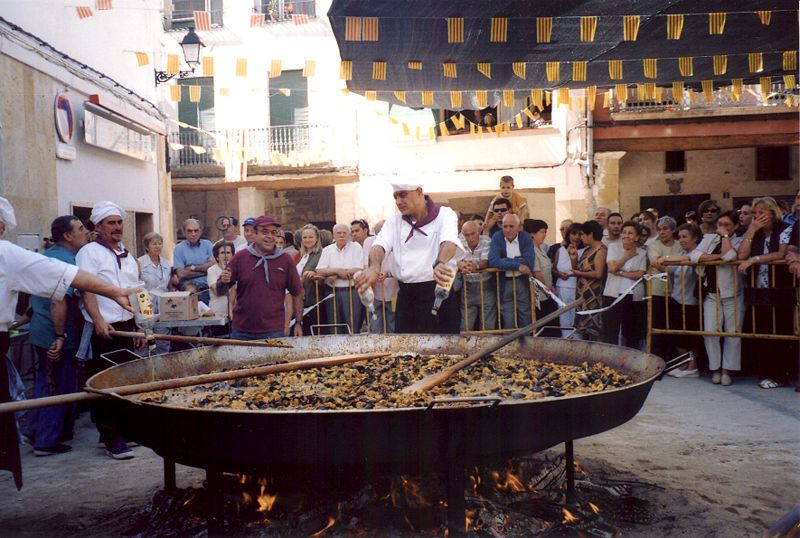
 0
Like
Published at 7:09 PM Comments (0)
0
Like
Published at 7:09 PM Comments (0)
Be honest - do you know your 'pors' from your 'paras?'
Wednesday, March 6, 2013
No, this isn't a personal question, but it's something that's bothered me ever since I've been learning Spanish. In many ways, Spanish is much less complicated than English. Think of that wonderful word 'hay' - not the stuff that horses eat, but the Spanish word for 'there is' or 'there are.' That one word does the word of two - it's a sort of BOGOF language offer - and it's the same whether it's singular, plural or a question.
To make up for this, the Spanish have two words which mean 'for.' At first, I wrote 'the Spanish have two words for for,' but that was confusing, so I changed it. If your spelling isn't up to much, you might think i meant two words for 'four,' when of course there's just the one - cuatro.
As I said at the start, I've never been sure which word to use in which circumstances, but our Spanish tutor Alan explained it in his own inimitable fashion. The analogy is Alan's, but I made it sound good by expanding on the story. Mustn't praise him too much, or he'll get above himself, and that would never do.
Just imagine you want to buy a camel for your wife - maybe it's her birthday, or your anniversary, and you're stuck for an idea for a present. By pure coincidence, there's a guy in Lemon Tree Market with a camel for sale, so you know this gift was just meant to be. Here's where it gets tricky.
If you say 'Quiero un camello por mi mujer,' he'll give your wife a good looking over, and maybe check her teeth to see if she's got a few good years left in her, because what you've just said is that you'd like to exchange your wife for a camel. Before you do the transaction, think very carefully - could the camel do everything your wife could do, and a bit more besides, because if the answer is 'no,' it's not a very good swap.
Simply put, 'por' is used for two way traffic. Think 'in exchange for' = 'por.' Most people are familiar with the phrase 'por favor,' which is used to say 'please' in Spanish. You may not think of that as two way traffic, but it is, because when you say 'por favor,' you're asking someone to do something for you. You ask, they agree - or refuse, if they're having a bad day, or they don't like the look of you.
Now, if you say 'Quiero un camello para mi mujer,' the camel seller will come up with a price - once he's told you that this is the best camel on the Costa Blanca, and it breaks his heart to sell it, but he has a wife and 17 kids to feed. On the other hand, the camel may be fit only for the knacker's yard, in which case, it may be better to look for another present for your wife.

 0
Like
Published at 10:15 PM Comments (2)
0
Like
Published at 10:15 PM Comments (2)
Spain - you live here, but would you die here, given the choice?
Tuesday, March 5, 2013
This post was inspired by a forum post I read elsewhere on EOS today. Somebody said they loved living in Spain - in fact it shone through their response - but they wrapped up the post by saying they wanted to end their days in the UK. Another responder asked why they would want to do that, and it got me thinking about life, death, and where we want to end up. I'm not talking about Upstairs with wings, or Downstairs shovelling coal, I mean here and now, and where and why.
Several of my friends have said they'd prefer to go 'home' to die, but they can't explain why - it's just the way they feel. I suspect it's to do with wanting friends and family to attend the funeral. That can be difficult when those friends and family are a thousand miles away, and Spain almost wants to bury or cremate you before you're properly dead, as the last rites follow the last breath pretty swiftly. There may also be an element of wanting somewhere convenient for your friends and relatives to come with flowers, or simply to remember you, but the truth is, they probably won't even bother, even for significant dates.
I think the main thing is, these people don't think of Spain as home, and they think dying here is a betrayal of their roots and their culture, even if, as in some cases, they've lived in Spain for as long as they've lived in the UK. They want to die where the people speak their lingo and the rituals are familiar. And maybe they don't fancy going 'ashes to ashes' in a Tantorio on an industrial estate. Who knows?
I do know that, when I have the misfortune to wake up dead, I don't really mind where I am. It's the time between now and then that is more of a concern to me - I don't want to die anywhere just at the moment, because life is just too good to leave behind. My husband Tony is 79, and in the normal run of things, he'll go before me as I'm 'only' 60. My mother always tried to warn me about 'dirty old men,' but I never imagined I'd be lucky enough to land one of my own!
Friends and family say I'll 'have to' go back to the UK if something happens to Tony, but I don't see why I should. As far as I'm concerned, Spain is home, and you don't usually up sticks and leave home when someone dies. On the other hand, he feels he'd have no choice other than to return to the UK, as he doesn't speak Spanish, and he can't drive because of vision problems.
Tony often says he doesn't want me spending a fortune to dispose of him, and like me, he doesn't mind where he is when the end comes, as long as it's not within the next few days, weeks and months. He says he'd like to be cremated, but I have my reservations about that. With all the red wine and brandy he's put away since we've been here, it will probably take a week to put the flames out.
We create scenarios where I say I'll strap him in the passenger seat of our motor home, and get him back to the UK, because we're long standing members of the Co-op, and we can save £100 on the funeral. If I get stopped, I'll just say he's so terrified of my driving, he's speechless, or something like that. It could be something like the Monty Python 'Dead Parrot' sketch, only even sillier.
All joking aside, I really don't think it matters where you end your days, although I respect the views of others who may think differently. The most important thing is how you live your life, so we don't waste valuable time stressing about where we're going to die.

 0
Like
Published at 10:25 PM Comments (3)
0
Like
Published at 10:25 PM Comments (3)
Guernica - Have you read it? If not, you should!
Tuesday, March 5, 2013
Most people with any knowledge of Spanish history will know the story of Guernica - the small Basque town in Northern Spain that is at the heart of Basque culture. On Monday, April 26, at around 3.30 in the afternoon, when all of Guernica was at the weekly market, the Luftwaffe unleashed its bombs on Guernica in a chilling dress rehearsal for World War II.
The town wasn't a military target, but by its bombing, Franco and his German allies hoped to destroy the heart and soul of the Basque nation. Times correspondent George Lowther Steer told the world of the atrocity that was Guernica, and when Pablo Picasso read of it in France, the idea for his greatest and most well known painting was born. Picasso had been commissioned by the Spanish Republican Government to create a mural for the Paris Exhibition of 1937. He ditched his previous plans, and created a memorial to one of the worst acts of terrorism of the 20th - or indeed any - century.
Fast forward to 2008, and American sports writer Dave Boling rolled out his first - and so far only - novel. Entitled simply Guernica, at heart, it's a love story but it's not just a story of romantic love - it's love of a family, a nation, a culture, and above all, it's a testament to the sheer love of life that's exhibited by Spanish people in general, and the Basques in particular.
The first half of the novel tells the story of the Ansotegui family, their life on their farm above Guernica, and the meeting of Miren Ansotegui and Miguel Navarro, who was forced to flee from the Guardia Civil at Christmas, 1935. It's sometimes moving, and often funny. Boling is married to a Basque girl whose family fled to America at the height of the Spanish Civil War, and his understanding of and love of the Basque culture shines through every page.
The mood of the book switches on April 26, and the description of the bombing of Guernica is graphic and terrifying. You can almost smell the fires, and your heart breaks for the suffering these brave, proud people were forced to endure. However, the Ansotegui family - like the Basque nation - refuse to be destroyed, and their courage and determination is both humbling and inspiring.
It's an overworked phrase that 'you can't put a book down,' but it's true when it comes to Guernica. It takes my husband Tony forever to read a book - babies are born, potty trained and start pre-school while he's working his way through the average novel - but he got through Guernica in three days. When he'd read it, he said he wanted to go there and see it for himself.
I didn't exactly laugh at him , but I did wonder if he'd been overdoing it with the vino tinto and gone all sentimental on me. When I finished the book, I felt exactly the same, and so has everyone else I know who has read it. If you've read Guernica, tell us what you thought of it. If you haven't, you really should. It will make you laugh, it will make you cry, but above all, it will make you think.

 0
Like
Published at 9:44 PM Comments (2)
0
Like
Published at 9:44 PM Comments (2)
Just another day in the wine showroom
Tuesday, March 5, 2013
Last week, one of my freelance clients asked me to do a business piece about a local expat businessman who is running a wine and seafood showroom, office and export business in our local commercial centre in Algorfa. As Erik - who runs Balt-Scandic with his partner, Roma - is a very busy man, the only way he could make the interview was if I went to the showroom, where he could talk to me between customers, and also let me try some of the wines. Yes, I know - it's a lousy job, but somebody has to do it!
This blog post was going to be about Erik's business model, with a bit of human interest thrown in, but I got talking to some of the people that came through the doors in the couple of hours I was there. I thought I'd share that first, then look into some of the interesting aspects of the business in later posts.
Basically, the showroom serves as an office for Erik's export business to Scandinavia and the Baltic countries, and a showroom where his clients who come to Spain on holiday can see and try the wines they're getting. In between all that, Erik also sells wine, seafood, olive oil and Scandinavian licorice products and other confectionery to anyone who's lucky enough to be passing during opening hours.
The first thing he says when you walk in the shop is, 'Would you like to try some wine while you look around?' And it's not served up in a plastic cup - it takes a proper wine glass to showcase these DO wines from small producers in a ring around the area. The two young mothers who came in with their children had obviously not expected that. They were just looking for a bottle of wine to enjoy with dinner, but after trying two or three organic reds at 4 Euro a bottle, they left the shop giggling - and with around 25 Euro of wine and chocolate. I just hope Trafico aren't breathalysing mums with pushchairs these days, because they'd probably have failed the test!
A little later, a 40-something couple who are regular customers came in for scallops for supper, and to replenish their wine stocks. They remarked how nice it was to be able to get decent wines without going into town or paying telephone number prices, and I had to agree with that. Another 40 Euro changed hands, and Erik said that's a typical sale. People come in, try a couple of wines, look around and take back enough to last a while. Even though they're local, a lot of the customers are busy people in their 40s and 50s, and they appreciate having quality on the doorstep.
Just before I left - with about six pages of notes and several glasses of very good rose on board - a retired couple came into the shop. It was their first visit, and the husband looked very Spanish, although he spoke with no trace of an accent. When we got talking, it turned out that he was born in Barcelona - and no, his name wasn't Manuel, and he wasn't a waiter in Fawlty Towers. His family brought him to England as a three-month old baby at the start of the Spanish Civil War, and he'd lived in Europe for most of his life, but had now returned to his homeland.
We had a very interesting discussion about that period - I'm interested in it as well, and I've recently read a stunning novel called Guernica, by Dave Boling. it turned out he hadn't read it, so I filled him in on a few details, and told him where to get it. When I've got time, I'll review it here. The trouble is, I have so many ideas for posts, I sometimes feel as if I'll never get around to them all.
If you're in the vicinity of La Finca Commercial Centre in Algorfa between noon and 7.00pm, call in and see Erik. Tell him Sandra sent you, and he'll give you an extra glass of wine. In fact, it may be a good idea to walk - or at least get someone else to drive!

 0
Like
Published at 1:24 AM Comments (1)
0
Like
Published at 1:24 AM Comments (1)
Things to think about when buying on a community
Monday, March 4, 2013
Before we made the decision to buy in Spain, we spent about three years researching - reading books, checking expat websites and forums, watching Living in the Sun - you name it, we covered it. Or at least we thought we did. One thing we hadn't reckoned with was the problems that can arise from living on a community.
Financial issues
Everyone is going to have their own ideas about how the community should be run, and how the budget should be administered. The trouble is, the ones who are the most vocal about this are often the ones who won't put themselves forward to help with the running of the community.
And that makes for division in the community, because whatever the management board decide, there'll be people against it, and they'll work to persuade other community members to see it their way. Inevitably, there will be divisions in the community and fractured friendships.
Breaking the rules
One thing you'll hear a lot on communities is that 'rules are meant to be broken,' but that's just not the case. Community rules are agreed by the community, for the benefit and comfort of all the residents, and you're never going to please everyone. However, once you've voted in the rules, you should at least try to stick to them, and be sure your visitors and holiday guests do the same.
It's the British mindset that's the problem - 'An Englishman's home is his castle,' and he won't be told what to do. If Little Johnny wants to take an inflatable the size of a small country into the communal swimming pool, Mum and Dad will let him do it, even if the rules state otherwise, because 'It's our home, we pay into the community, so we'll do what we like.'
The thing is, in Spain, on urbanisations and communities, it's very different. to life in England. If you want to live without rules, don't buy on a community. If you decide you want the convenience of living on a community, abide by the rules. 'Simples,' as that irritating furry thing says.
Living in Little England
We're lucky that the majority of residents on our community are all keen on experiencing Spanish life as it's lived, rather than recreating England in the sun. However, I know of other communities where they seem to be totally oblivious to the fact that they're living in Spain, and this is not something you can find out from the Estate Agent or the Abogado. You need to live there to find out how the community works, and by then it's too late.
It can get very personal
It's ironic, really, but people will persuade someone on their community to stand as President because they feel they'll do a good job, but immediately their choice is incumbent, he or she is suddenly the worst person in the world to run the community. It happens time and again, so if you want to be popular with your neighbours, don't even consider standing for President.
It's a very worthwhile job to take on, and it takes a special kind of person to do it, but it can be a thankless task. If despite these warnings from one who's been there you still fancy a stint as President of your community, be prepared for a lot of stress and do your best to grow a very thick skin.
Maybe you think from reading this that living on a community is to be avoided at all costs, but that's not necessarily the case. Community life can be very rewarding, but if you really want to absorb Spanish culture, and if you don't fancy getting into a heated debate over how the community budget should be allocated each time the AGM comes around, maybe you would be happier in a village or a town, rather than on a community within an urbanisation.
.JPG)
 0
Like
Published at 12:26 AM Comments (0)
0
Like
Published at 12:26 AM Comments (0)
Sometimes, I'm ashamed to be British, I really am!
Sunday, March 3, 2013
A couple of weeks back, Himself was 79, and he has the idea fixed in his head that each birthday is likely to be his last, so he wants to do something different, even though it's not a 'landmark. We decided to go to Benidorm with friends for a 4 day all inclusive break. We've used the hotel before, and we know the food and the entertainment is good, so it seemed like a plan. There were dancing girls on Friday, so if the Birthday Boy did expire from all the excitement, at least he'd have gone with a smile on his face.
We thought we were fortunate to share the hotel with two coach parties of Spanish pensioners. They may have been even older than my Tony, but they were full of life, and singing, dancing and drinking into the small hours. I've never been pulled up into so many congas in such a short space of time, and a group of ladies from Andalucia decided to teach me the finer points of flamenco. They really made the holiday for us, but not all the Brits in the hotel were of the same mind, and it made for some rather ugly moments.
The compere was brilliant - he was a young guy called Luis, and he did everything in Spanish and English. He even did the announcements in German, for a couple of families, and he had a stab at Swedish as well. One announcement was obviously for one of the coach parties, because they were talking about arrangements for the morning, but one of the British contingent complained loudly that they were 'talking behind our backs, so say what you've got to say in English.' Luis explained that it was purely an arrangement for a small number of Spanish people, so it was not necessary to translate. Cue lots of muttering along the lines of 'We're here on holiday, we expect to be told what's going on.'
On the second night, the pensioners put on some extra entertainment. One of their number was a keyboard player with a great voice - even though he must have been at least 80 - and he serenaded us for an hour with Spanish songs of different tempos, so we could all get up and dance. Again, there were complaints of 'Why doesn't he sing in English,' even though a lot of the songs were Spanish versions of international hits.
On our last night, when Luis announced the entertainment for the following evening and said that it would be an English singer, the Flip Flop and Chips Brigade - which was what we'd christened them - started clapping and cheering. Heaven knows what those Spanish pensionistas must have thought. We felt obliged to apologise on behalf of our countrymen, although we thoroughly enjoyed the non-stop partying that happened as soon as the coach parties came in after dinner.
Everyone had smiles on their faces - except for the small Brit contingent that were causing all the trouble. It made me ashamed to be British - and not for the first time. The entertainment was first class, the food was plentiful, and geared towards all tastes, yet these people seemed determined to find fault, and expected everything to be conducted for their benefit. It's not often I'm speechless, but I came pretty close during that break.
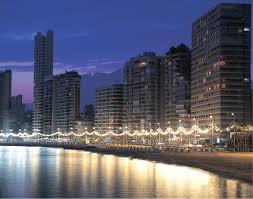
 0
Like
Published at 7:17 PM Comments (4)
0
Like
Published at 7:17 PM Comments (4)
A real bargain in the market today!
Sunday, March 3, 2013
I love going to the Sunday market off the Lemon Tree Road at Campo de Guardamar, in the Costa Blanca. It's a real Spanish market, which you can tell, because of all the 'madres' going around with their shopping trollies. There's a huge fruit and vegetable section, and everything seems much cheaper than the other markets in the area.
My friends Joan and Pat love to come along, and we'll usually stop off at one of the many cafeterias and have something to eat and drink and watch the world go by. We leave the husbands behind, or if they decide they want to tag along, we deposit them at a bar while we have a good look around, as their attention span seems to get shorter with every market trip.
Today, we were passing a stall and the young - and very good looking - stallholder had hooked down some trousers from the top of the stall to show to a potential customer. There was a makeshift price tag hanging from the coathanger, and he'd taken it off and hooked it around his neck. So we come to this stall, and there's this gorgeous guy with huge dark eyes, curly black hair and the body of a god - and I'm not talking Buddha here, he was built like a dream. And he's got a sign around his kneck saying '5 Euro.'
What's a girl to do? Well, this girl fished in her bag for a 5 Euro note and asked if he was coming with me now, or did I have to wait until he'd finished on the stall? Pat and Joan tried to pretend they weren't with me, but the stallholder played along with it all, took my arm and marched me off towards the car park. As the conversation was conducted in Spanish, it caused quite a bit of hilarity as well. Trouble is, I may have to go on my own next week - Pat and Joan are refusing to come with me again!

 0
Like
Published at 4:13 PM Comments (2)
0
Like
Published at 4:13 PM Comments (2)
Renting or buying - which is best?
Saturday, March 2, 2013
At the moment, it's a buyer's market in Spain. Prices are probably as low as they're likely to go, and people desperate to sell are throwing in extras like a car with the property, or membership to the local golf club. That said, it may not be in your best interests to buy, so how do you decide what to do? Here's a breakdown of the plus points for buying and renting in Spain in 2013.
Buying
For some people, buying is the only way to go. They want something to call their own, and to pass on to their heirs when the time comes. You should considet buying in Spain if you have liquid assets and therefore will not need a mortgage or any other sort of finance from an outside agent to buy a property.
At the moment, it's possible to buy any type of property for around half the price in Euros you would have paid five years ago. Also, there are so many properties on the market you can probably broker a deal to get the place you want for the price you're prepared to pay.
Even if you don't intend to live in your property or rent it out, you're buying at the bottom of the market, and interest on savings is very low. If you can hold out until prices rise - which inevitably they will - you'll realise a much better return on your investment by putting your capital in bricks and mortar.
Renting
Because there are so many properties on the market, and prices are low, many owners are looking at long term lets to keep up the cash flow until the property market gains ground. There are good deals to be had, and long term renters can apply to become permanent residents and enjoy all the benefits that come with that status.
Renting is a good option if you're not sure which area you want to settle in, or if you need to sell a property in another country before committing to buying in Spain. If you're renting, you're flexible - if you don't want to settle in a particular area, or your circumstances change, all you need to do is give notice as per your rental agreement and you're free to move on.
Maybe it's not something you want to think about, but what happens if your partner dies or becomes seriously ill? It's not a problem if you intend to stay in Spain, but if you need the support of your family, or want to return to your home country, it's much easier to do so if you're renting. You don't have capital tied up in Spain, and you don't need to stay to oversee the sale of your property. And it's one less problem to cope with at a very stressful time in your life.
If you're not working in Spain - maybe you've decided to retire here - renting means you have no personal tax liabilities to sort out, so you don't have to pay an abogado to sort out your fiscal affairs. It can be much more simple to rent rather than to buy. And if you're in your 70s when you move here, it may make more financial sense to invest the proceeds from the sale of your property in your home country and rent in Spain. Renting is not such an attractive option for a young family with school age children who may be looking at 10 - 15 years before they can consider a move.
When it comes down to it, you have to do what is best for you. We never considered renting, because we didn't realise how simple it could be, as opposed to buying a property. Although we're delighted with our garden apartment, I think if we'd have been better informed, we may have chosen to rent rather than buy. Tony - my husband - was 74 when we sold our house in the UK, so renting may have been better, particularly as we bought at the top of the market. Still, as we're not looking to sell, it doesn't really matter what the market is doing, does it?
.JPG)
 0
Like
Published at 11:10 PM Comments (5)
0
Like
Published at 11:10 PM Comments (5)
Maintaining an affordable UK base
Saturday, March 2, 2013
When we bought our apartment in Spain five years ago, we kept our holiday chalet in North Cornwall as a UK base. We intended to divide our time between Spain and the UK, as we have a number of family members and friends who are not in a position to come to Spain, and we didn't want to lose touch.
However, our 20' x 16' shed in a field - which is all it was, although it was a very comfortable shed in a field - cost us £900 a year in Council Tax. And Cornwall has the most expensive water rates in the country. On top of that, the site was sold, and the new owner doubled the service charges. Add in electric, insurance and Calor gas, and our well-appointed shed was costing us £5,000 a year, whether we used it or not.
In 2009, which was our first full year as half-and-half expats, we spent 15 weeks in the chalet. We have friends and family scattered all over the UK, and we also have a motor home, which we like to take advantage of in the UK and Europe, so in real terms, it cost us almost £350 a week to stay in our own property. We could have stayed in a B & B for that, and had one meal a day included.
Much as we loved the chalet - which we'd owned for more than 20 years - we just couldn't afford to keep it going. On the other hand, we needed a UK base, because it's unfair rely on the hospitality of friends and family, and we weren't prepared to use somebody else's address as our own, because it's not playing the game. We spend half the year in the UK, and therefore we are still classed as UK residents, and we have to have a permanent UK address.
We had an offer for the chalet, and at the same time, our daughter and son-in-law told us that there was a static caravan for sale in Bigbury Bay, Devon, where they were based. The big advantage is that static caravans are not liable for Council Tax. On top of that, the site management fees include water and electric, so we know that once we've paid our site fees, all we have to pay for is the occasional bottle of Calor gas for the cooker and the water heater.
When we're in Devon, we have what our son-in-law calls a 'Million pound view,' without the hassle and expense of maintaining a property. When we're in Spain, we know that our caravan is looked after, and that we can take advantage of the occasional let to help out with expenses.
If you're wondering whether you can afford to keep a home in two countries, maybe a static caravan is the answer to your problem. It's more like a real home than a touring caravan, as the utilities are connected directly to your unit, and you have security of tenure. As long as you comply with the site rules, your pitch is your own for as long as you want it. You need to budget for replacing the caravan after 10 or 15 years, depending on the policy on your site, but it's a much cheaper option than maintaining a bricks and mortar property. It may be worth your while to check out the options in your area of the UK.
.JPG)
 0
Like
Published at 9:29 PM Comments (0)
0
Like
Published at 9:29 PM Comments (0)
Watch out - the Pine Caterpillars are about!
Friday, March 1, 2013
In Spain, the crawlies are usually creepier, bigger and more dangerous than anything you may have come across in the UK. And the Pine Caterpillar, also known as the Processional Caterpillar, is really nasty. What it lacks in size it makes up for in nuisance value and danger to pine trees, pets and people.
These are not fluffy and friendly like those 'wooly bear' caterpillars that schoolboys love to terrorise schoolgirls with - or was it only me that used to get them stuffed down the back of my liberty bodice? The hairs of the Pine Caterpillar are poisonous, and can cause rashes, pain and, in the case of puppies or kittens, even death. As you’d expect from the name, they live in large, cocoon-like nests in pine trees. They strip the trees of their needles, then march in a nose-to-tail procession to the next healthy tree. For little critters, they have a voracious appetite and can demolish whole pine forests in no time.
Pine Caterpillars are usually active from January to April, and are most dangerous in the middle of February. We’re lucky in that we have no pine trees close to our property, but if you have Pine Caterpillars for neighbours, there is really only one safe solution – exterminate! Those of a nervous disposition may want to look away now, because here's how to conduct your very own Pine Caterpillar Massacre.
If the caterpillars are in procession on the ground, spray them with lighter fuel, then set fire to them. If you find cocoons in your pine trees, first spray with hairspray to minimise the risk of flying hairs. Then use a stick and a pair of tree loppers to cover the cocoon with a plastic bag, cut off the infested branch and then burn the whole cocoon. Just be careful not to start a forest fire, won’t you?
Is all this really necessary? Well, yes it is, because just as a wasp can still sting after death, the Pine Caterpillars’ hairs remain poisonous, so cremation is the only safe answer. If you feel guilty about causing such suffering to one of God’s creatures, just think of it as war. What would you rather have? A flame-grilled caterpillar or a child in pain and distress after getting too close to this nasty specimen of the natural world?
If you live near pine trees, keep in some antihistamines in case anyone comes into contact with Pine Caterpillars. If one lands on you or a member of your family, resist the urge to brush it off with your hands, Use a stick, or shake your clothes to remove it. If a member of your family or a pet shows any signs of shock after being in contact with a Pine Caterpillar, seek medical or veterinary advice immediately. Be careful out there!

 0
Like
Published at 11:46 PM Comments (0)
0
Like
Published at 11:46 PM Comments (0)
One changed letter makes a world of difference in Spanish!
Friday, March 1, 2013
In some ways, Spanish can be very straightforward to learn. For example, you can turn a statement into a question with the inflexion in your voice, and the word 'hay' covers 'there is' and 'there are' in all sorts of situations, both as a question and a statement.
However, some words are very similar indeed, with only a single letter distinguishing between one word and another. But oh, what a difference a letter can make to the unwary, as you will see.
A friend of mine wanted to order cushions for her new sofa in Spanish. After much perusal of her Spanish grammar book, she confidently told the assistant, ‘Quiero comprar los cojones verdes para mi sofa, por favor.’
She was extremely puzzled - and a little hurt - when everyone within hearing range fell about laughing. After a couple of minutes, the store manager - whose English was much more advanced than my friend’s Spanish - calmed down enough to explain that what she’d actually said was 'I want to buy some green testicles for my sofa!' Of course, the word she meant to use was 'cojines' - replacing the ‘i’ with an ‘o’ gave the word a completely different meaning, and also gave the furniture store manager a great story to dine out on.
Remaining with the male anatomy for a moment, take care if when you ask for a ‘pollo.’ (chicken) In most cases, getting the gender of a word wrong doesn’t really matter, as your meaning will usually be clear from the context of the sentence. However, if you ask for a ‘polla’ by mistake, you’ll get some very funny looks and may even be thrown out of the store, as this is a (very rude) slang term for – well, another part of the male anatomy. If you don’t believe me, Google ‘Chupame la polla,’ but whatever you do, don’t say it to anybody who’s bigger than you or wearing a uniform!
Don’t let these anecdotes deter you from learning Spanish - I don't want to put you off, but I am trying to make the learning more fun. Just be careful out there. I also need to be careful in choosing an image for this, otherwise this could well be my last blog post!

 0
Like
Published at 10:03 AM Comments (3)
0
Like
Published at 10:03 AM Comments (3)
Spam post or Abuse? Please let us know
|
|